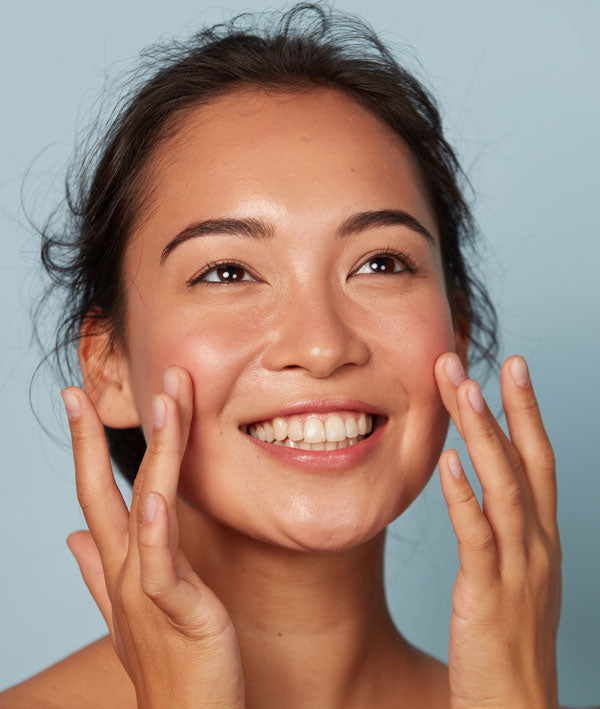Oily skin is characterized by excess sebum production, which can leave your face looking shiny or greasy, especially in the T-zone (forehead, nose, and chin). Here are common signs that you might have oily skin:
-
Shiny Appearance: Your skin looks consistently shiny, even after cleansing.
-
Frequent Breakouts: Excess oil can clog pores, leading to acne, blackheads, and whiteheads.
-
Visible Pores: Enlarged pores, particularly around the nose and cheeks, are a hallmark of oily skin.
-
Makeup Doesn't Stay Put: If your makeup often slides off or disappears midday, excess oil may be the culprit.
If you experience these symptoms, your skin type is likely oily, and adopting the right skincare routine can help manage it.
Causes of Oily Skin
Understanding the causes of oily skin is essential for addressing it effectively. Here are some common factors:
-
Genetics: If your family has a history of oily skin, you’re more likely to inherit it.
-
Hormonal Changes: Hormonal fluctuations during puberty, menstruation, pregnancy, or menopause can trigger excess oil production.
-
Climate: Hot and humid weather often exacerbates oily skin.
-
Over-cleansing: Washing your face too often can strip your skin of its natural oils, prompting your sebaceous glands to produce even more oil.
-
Using the Wrong Products: Heavy, pore-clogging products can contribute to oily skin issues.
Ingredients to Avoid If You Have Oily Skin
Certain ingredients can worsen oiliness or clog pores, making it important to check labels before buying skincare products. Here’s what to steer clear of:
-
Mineral Oil: This heavy ingredient can clog pores and exacerbate shine.
-
Petroleum Jelly: While hydrating, it’s not ideal for oily skin types as it can trap sebum.
-
Silicones: Found in primers and moisturizers, silicones can create a barrier on the skin, leading to clogged pores.
-
Alcohol-based Ingredients: While these may feel refreshing, they can strip your skin and trigger excess oil production as your skin compensates for dryness.
-
Fragrances: Artificial fragrances can irritate your skin, potentially causing inflammation and excess sebum production.
Ingredients to Add If You Have Oily Skin
On the flip side, these ingredients can help balance and soothe oily skin:
-
Salicylic Acid: A beta-hydroxy acid (BHA) that penetrates pores to remove excess oil and dead skin cells.
-
Niacinamide: This vitamin B3 derivative regulates oil production and reduces the appearance of large pores.
-
Clay (Kaolin or Bentonite): Excellent for absorbing excess oil without over-drying the skin.
-
Hyaluronic Acid: Provides lightweight hydration, ensuring your skin stays moisturized without feeling greasy.
-
Tea Tree Oil: Known for its antibacterial properties, it’s great for keeping acne at bay.
-
Retinoids: These vitamin A derivatives help reduce oil production and prevent clogged pores over time.
Best Skincare Products for Oily Skin
Finding the right products for oily skin can make a significant difference. Below are the top product types to incorporate into your routine:
1. Gel-based Cleanser
A lightweight, gel-based cleanser is ideal for oily skin. It effectively removes dirt and oil without stripping the skin’s natural moisture barrier.
2. Exfoliating Toner
Look for a toner containing salicylic acid or glycolic acid. These exfoliants unclog pores and reduce shine, leaving your skin refreshed and balanced.
3. Oil-free Moisturizer
An oil-free, non-comedogenic moisturizer with ingredients like niacinamide or hyaluronic acid ensures hydration without adding extra grease.
4. Clay Mask
Use a clay mask once or twice a week to draw out impurities and control excess oil production. Kaolin and bentonite clay are particularly effective.
5. Blotting Sheets
Keep blotting sheets handy for quick touch-ups during the day. They absorb excess oil without disturbing your makeup.
6. Mattifying Primer
A mattifying primer can help control oil production and create a smooth canvas for makeup application. Look for silicone-free options to avoid clogged pores.
7. Oil-free Sunscreen
Choose a sunscreen labeled as oil-free and non-comedogenic. Gel or fluid formulations tend to work best for oily skin.
8. Spot Treatment
For acne-prone oily skin, a spot treatment with benzoyl peroxide or tea tree oil can help reduce blemishes quickly.
9. Lightweight Serum
A serum such as hyaluronic acid or vitamin c can help balance oil production and improve skin texture without weighing your skin down.
10. Micellar Water
Micellar water is perfect for removing excess oil and makeup at the end of the day. Opt for one designed for oily skin to ensure it’s gentle yet effective.
Managing oily skin requires a combination of the right products and an understanding of your skin’s needs. By avoiding heavy, pore-clogging ingredients and incorporating lightweight, oil-balancing products into your routine, you can keep excess shine at bay and maintain a healthy complexion.






